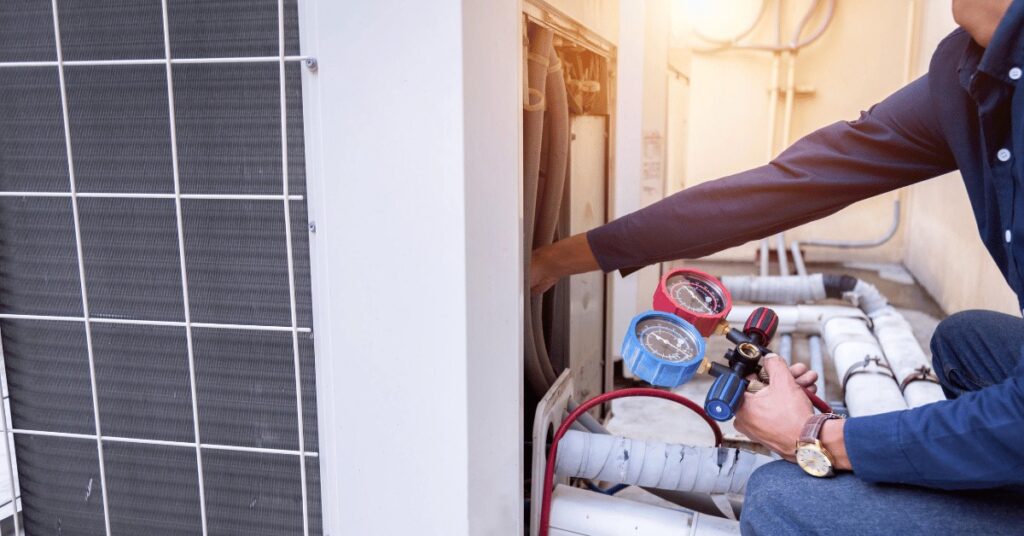Ducts are typically located in non-conditioned areas and often go unnoticed or unchecked. This can lead to rising energy bills if leaks go undetected. Even when filters, coils, thermostats, and refrigerant levels are monitored, duct issues can significantly reduce efficiency. To maximize the performance of an air conditioning system, it is important to change air filters regularly, clean ducts and vents, upgrade thermostats, schedule professional tune-ups, and follow other recommended maintenance practices.
Dallas’s Climate Vs Your HVAC System
Dallas weather is demanding on HVAC systems. With summer temperatures regularly exceeding 100°F, air conditioners operate almost continuously. This increased workload leads to higher bills, more frequent breakdowns, and shorter equipment life, especially in homes with poor insulation or leaky ductwork.
Humidity adds an additional challenge. High moisture levels force the system to work harder to dehumidify, potentially causing mold growth, musty odors, and uneven comfort. Even a large AC unit can struggle if filters and coils are not cleaned regularly.
While the focus is often on heat, Dallas winters bring sudden cold snaps. Older furnaces and poorly maintained heat pumps can struggle to provide consistent heating, which may result in uneven warmth or frozen pipes.
HVAC Maintenance Tips for Every Season
Maintaining HVAC systems requires year-round attention. Dallas weather varies from extreme summer heat to unexpected winter cold snaps, so each season presents unique challenges. The following checklist helps keep systems efficient and homes comfortable.
Spring: Prep for Cooling Season
- Inspect and replace air filters (every 1–3 months) to maintain airflow and clean air.
- Clear debris around the outdoor unit, including leaves, branches, and dirt to optimize airflow.
- Check and clean condenser and evaporator coils to improve cooling efficiency.
- Inspect ductwork for leaks or blockages, and seal or clean as needed.
- Test thermostat settings and consider upgrading to a programmable or smart model.
Summer: Stay Cool and Efficient
- Clean or replace air filters frequently, even every 2 weeks during heat waves.
- Clean condenser coils and remove debris to prevent overheating.
- Check refrigerant levels and inspect for leaks that reduce cooling efficiency.
- Maintain airflow by cleaning vents and registers; avoid closing them unnecessarily.
- Avoid over-lowering the thermostat; use fans to support comfort without straining the system.
Fall: Prepare for Heating Season
- Schedule a furnace inspection before the heating season begins.
- Replace air filters as allergens and cooling residue accumulate.
- Seal drafts around windows and doors to prevent heat loss.
- Test carbon monoxide detectors to ensure safety.
- Change thermostat batteries and optimize settings.
Winter: Keep Warm Safely
- Replace or clean air filters regularly to maintain airflow during heavy usage.
- Inspect and clean ducts if allergens, mold, or debris may affect performance.
- Upgrade thermostats to smart controls for better energy management.
- Schedule professional furnace inspections, including the heat exchanger, flue, and burners.
- Check smoke and carbon monoxide detectors for gas heating safety.
Bonus Tips for Year-Round Care in Dallas’s Climate
- Monthly filter replacement. Dust and heat reduce filter effectiveness quickly. Replace basic filters every 30–60 days, pleated filters every 60–90 days, and high-efficiency filters like HEPA every 4–6 months.
- Maintain clearance around the outdoor unit. Keep about 2 feet of space free from plants and debris to ensure optimal airflow.
- Avoid extreme thermostat settings. Very low temperatures do not cool faster and strain the system; pair with fans instead. Ceiling fans can reduce room temperature by up to 4°F.
- Ensure heater safety. Verify proper function of smoke and carbon monoxide detectors before winter begins.
- Schedule biannual professional tune-ups. Service before peak summer and winter usage ensures maximum performance and longevity.
When to Repair vs. When to Replace Your HVAC System in Dallas
Deciding whether to repair or replace an HVAC system requires careful evaluation. Consider the following guidance to make an informed decision.
Signs the HVAC System Needs Repair
Regular maintenance and timely repairs extend the life of HVAC systems. Repairs are recommended if:
- Weak or insufficient airflow may indicate clogged filters, blocked ductwork, or a malfunctioning blower motor.
- Unusual noises, such as grinding, squealing, or rattling, suggest loose components or motor issues.
- Inconsistent temperatures, including excessively hot or cold rooms, may indicate problems with the thermostat, ductwork, or insulation.
- Musty odors can signal mold in ducts, while burning odors may indicate electrical issues.
- Water leaks or moisture around the unit can promote mold growth and damage the system.
If any of these issues occur, contact a professional HVAC service provider such as Lee Air Service for inspection and repair.
Signs the HVAC System Needs Replacement
Certain conditions indicate that replacement may be more cost-effective than ongoing repairs:
- Unit Age: Air conditioners typically last 10–15 years; furnaces last 15–20 years. Systems near or past these ages are often recommended for replacement.
- Frequent Repairs: High repair frequency suggests investing in a new, energy-efficient system.
- Rising Energy Costs: Older systems lose efficiency over time, leading to higher energy bills. Upgrading to a modern system reduces energy costs.
- Inconsistent Comfort: Hot or cold spots despite regular maintenance indicate the system may no longer meet requirements.
- Refrigerant Leaks: Units using phased-out R-22 refrigerant are less efficient and more expensive to repair.
Consulting with a professional like Lee Air Service helps determine suitable replacement options that match home needs and budget.
Final Notes
By monitoring these signs and taking timely action, homeowners can maintain comfort and energy efficiency year-round. From minor repairs to full system replacements, proactive maintenance prevents unexpected breakdowns in Dallas’s extreme heat or sudden cold snaps. Staying ahead of potential issues ensures systems operate efficiently and reliably. For personalized guidance and professional service, Lee Air Service can help determine whether repair or replacement is the most effective solution.
FAQs
What Are the Most Important Seasonal HVAC Maintenance Tasks?
Air filters, coils, ducts, and thermostats should be checked regularly. Professional inspections twice per year help maintain efficiency.
How Often Should Air Filters Be Replaced in Dallas?
Basic filters should be replaced every 30–60 days, pleated filters every 60–90 days, and HEPA filters every 4–6 months, depending on usage.
When Should an HVAC System Be Repaired Instead of Replaced?
Repairs are recommended for minor airflow issues, unusual noises, inconsistent temperatures, odors, or water leaks.
When Is It More Cost-Effective to Replace an HVAC System?
Replacement is often advisable for units over 10–15 years old, frequently requiring repairs, showing rising energy costs, or failing to provide consistent comfort.
How Can Professional Services Improve HVAC Efficiency?
Certified professionals ensure proper installation, maintenance, and repairs, reducing energy usage, preventing breakdowns, and extending the system’s lifespan.
Read More Gorod








